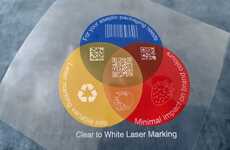
This Laser Technology is So Inexpensive, It Can Be Disposed After Use
Mishal Omar — May 4, 2016 — Tech
References: livescience
Lasers are generally made from materials that are inorganic, however researchers from France and Germany have been testing out creating organic laser technology and have been successful in their attempts.
There are several benefits to using organic lasers, including the fact that they are inexpensive and according to Live Science, "can emit light in a wide range of wavelengths." The downside is that their dyes tend to degrade rapidly. However, after producing these lasers in Inkjet printers, it is found that with the cost efficiency of organic lasers, replacing these degrading parts will not be an issue.
The laser dyes need to be mixed with ink in order to be printed and when the laser chip degrades it can easily be replaced. After further research, the organic lasers could one day be used for medical screening or pollution monitoring.
There are several benefits to using organic lasers, including the fact that they are inexpensive and according to Live Science, "can emit light in a wide range of wavelengths." The downside is that their dyes tend to degrade rapidly. However, after producing these lasers in Inkjet printers, it is found that with the cost efficiency of organic lasers, replacing these degrading parts will not be an issue.
The laser dyes need to be mixed with ink in order to be printed and when the laser chip degrades it can easily be replaced. After further research, the organic lasers could one day be used for medical screening or pollution monitoring.
Trend Themes
1. Organic Laser Technology - Creating inexpensive lasers with a wide range of wavelengths using organic materials.
2. Inkjet-printed Lasers - Using inkjet printers to produce laser chips that can be easily replaced when degraded.
3. Applications in Medical Screening and Pollution Monitoring - Potential uses of organic lasers in fields such as medical screening and pollution monitoring.
Industry Implications
1. Printing and Imaging - Incorporating organic laser technology into inkjet printing for various applications.
2. Medical Technology - Exploring the use of organic lasers for medical screening and diagnostics.
3. Environmental Monitoring - Utilizing organic laser technology for pollution monitoring and analysis.
2.3
Score
Popularity
Activity
Freshness























